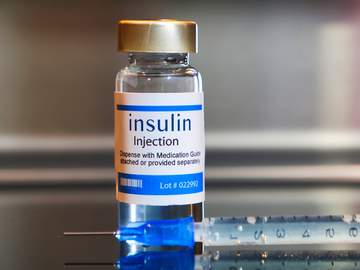
‘Insulin’
Insulin was in a number of news stories last week, after Republican senators voted against a cap on the price of this substance.
Patient advocates were disappointed with Sunday’s vote — Republican senators blocked the $35 insulin cap for private insurers — and expressed hope that federal and state measures could be included in legislation down the road.
— Berkeley Lovelace Jr., NBC News, 9 Aug. 2022
Here is a simplified definition for insulin: “a substance that your body makes and uses to turn sugar into energy.”
Here is a more technical (and complete) definition: “a protein pancreatic hormone secreted by the islets of Langerhans that is essential especially for the metabolism of carbohydrates, that is obtained commercially in crystalline form usually from beef or pork pancreas, and that is used in the treatment and control of diabetes mellitus.”
The word insulin comes from the Latin insula, (meaning “islet, a little island”). This name came about because insulin (the substance, not the word) comes from the islets of Langerhans, clusters of cells which were discovered in the 19th century by a German physician named Paul Langerhans.
‘Probable cause’
Reports that the F.B.I. had executed a search warrant at Donald Trump’s residence in Florida, and taken away a number of boxes of documents, caused lookups to spike for several entries, including probable cause.
Because the Fourth Amendment requires federal agents to describe both the place they intend to search and the “persons or things to be seized” before a warrant may issue, the FBI agents who searched Trump’s home would have needed a fairly good idea what they were looking for, and they would have needed probable cause to believe that they would find it within Mar-a-Lago.
— Ian Milhiser, Vox.com, 9 Aug. 2022
We provide multiple definitions for probable cause; the one from our Collegiate Dictionary is rather short, “a reasonable ground for supposing that a charge is well-founded.” The one from our Legal Dictionary is somewhat longer: “a reasonable ground in fact and circumstance for a belief in the existence of certain circumstances (as that an offense has been or is being committed, that a person is guilty of an offense, that a particular search will uncover contraband, that an item to be seized is in a particular place, or that a specific fact or cause of action exists).”
We also include a note at the entry for the legal definition of probable cause,” with additional information.
The Fourth Amendment to the U.S. Constitution stipulates that “no warrants shall issue, but upon probable cause.” Probable cause is also required for a warrantless arrest. Probable cause is an objective standard rather than a function of subjective opinion or suspicion not grounded in fact or circumstance. However, the facts or circumstances need not be of the nature of certainty necessary to establish proof in court.
Probable cause is also sometimes called reasonable cause, or sufficient cause. Raid and search also spiked in lookups as a result of the F.B.I.’s action; if you are interested in reading more about the difference between these two words you may do so here.
‘Inflection point’
President Biden signed into lawH.R. 4346 (The CHIPS and Science Act of 2022), and as a result inflection point saw more lookups than it usually does.
Now, it matters today, I think, more than any — in a very long, long time. You’re tired of hearing me say this, those that work with me so closely, but that’s because we face an inflection point in our nation and around the world.
— Remarks by President Biden at Signing of H.R. 4346 (whitehouse.gov) 9 Aug. 2022
Inflection point, as used by Biden in the preceding remarks, is synonymous with turning point, and carries the meaning “a moment when significant change occurs or may occur.” The original meaning of inflection point, however, was far more technical: it came into use in the beginning of the 17th century as a math term, meaning “a point on a curve that separates an arc concave upward from one concave downward and vice versa.”
Words Worth Knowing: ‘Roorback’
Our word worth knowing this week is roorback, defined as “a defamatory falsehood published for political effect.” This eponymous word comes from an attack on the 11th president of the United States, James Polk, one which claimed to quote from a book by a Baron von Roorback. The book did not exist.




